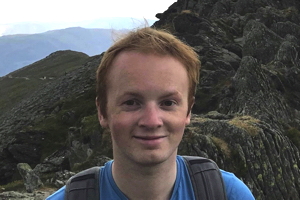Student testimonials
Maria Tsalakou, MSc Mathematics graduate
What first attracted you to St Andrews?
Towards the end of my undergraduate studies I was looking for an MSc programme that would allow me to deepen my knowledge in various areas of mathematics. I had also heard great things about the town.
What did you most enjoy about studying at the School of Mathematics and Statistics in St Andrews?
The environment in the School of Mathematics and Statistics is very supportive and motivating for undergraduate as well as postgraduate students.
What did you do after you graduated?
After graduating I went back to Cyprus for a year and worked for a company that specialized in market research. (I was mainly involved with the statistical analysis of data from customer satisfaction surveys.) Since September 2019, I am back in St Andrews as a PhD student in the algebra group.
What piece of advice would you give to individuals thinking of applying to study at the School of Mathematics and Statistics?
The MSc programme can be a great experience to explore the topics that interest you in mathematics but it is also an opportunity to get familiar with topics you hadn’t explored before.
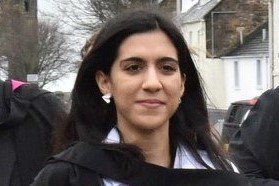
Jack Reid, current PhD student
Thesis title
A Model for Solar Flares and Coronal Heating based on Magnetohydrodynamic Avalanches
How would you describe your research project?
My research is in solar magnetohydrodynamics. In particular, like many in the St Andrews MHD group, I work on the coronal heating problem. I run 3D MHD codes to explore how the magnetic field and plasma interact to heat the corona through MHD avalanches. Here, local instabilities can start a chain of recurring, reconnection-triggered heating events, which maintain a hot corona across a spectrum of spatial and temporal scales.
What attracted you to undertake your research at St Andrews?
Studying solar MHD in St Andrews places me in a large group with a strong record of publications. The Group offers significant opportunities across the breadth of research within the field, and maintains collaborations and connections with many researchers across other institutions in the country. The wider University embarks upon highest-quality research, in many cases leading, while doing so from a comfortable, lovely, and remarkable environment.
How has the School of Mathematics and Statistics helped you with your research or to develop your skills and knowledge?
I know that I have benefited from the presence of the other research groups aside from own: with members of staff knowledgeable in analysis, fluid dynamics, and statistics among others, there is a wealth of expertise, which the amiability of all makes easy to tap. Since mathematical, and indeed all, knowledge is not strongly divided or truly modularized, it is sometimes necessary to get advice from across quite different fields, particularly when all in the School rely upon the same underlying mathematical toolkit. In our work, numerical simulation and modelling are cornerstone tools: in this, the School's access to computational resources, within the University and elsewhere, is a major asset.
What do you hope to do after you graduate?
Almost no undergraduate can answer that, and it is an even more difficult question for PhD students! Since postgraduates work far harder, it is difficult to look beyond graduation. However, I am currently exploring the possibilities that having a PhD offers, including remaining within academic research and teaching.
What piece of advice would you give to someone thinking about doing a PhD in Mathematics and Statistics?
Be open-minded, but aware: before starting, find out as much as possible what the work and interaction within any specific research field is like. Embarking on a PhD, it is important to know where that may lead, both in direction through areas of research and into one’s longer-term future. At the beginning, it is more important to be able to establish a good working relationship with one’s supervisor than to understand the proposal, since that relationship is what will see one through difficulties, should any arise.
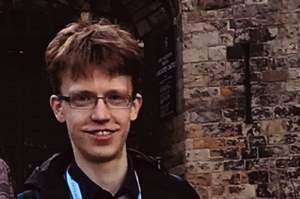
Felix Petersma, MSc Statistics graduate
What first attracted you to St Andrews?
After having spent most of my life living in a city, I was looking for smaller place to do my masters, preferably closer to nature. Scotland has always had a particular appeal to me because of its welcoming and beautiful, but also untamed scenery. My uncle is also Scottish, so maybe that had something to do with it. Looking for a smaller university in Scotland inevitably brought me to St Andrews, which was pretty much exactly what I was looking for. What finally convinced me to pursue a masters here was the presence of the Centre for Research in Ecological and Environmental Modelling (CREEM), one of the world’s leading research institutes in statistical ecology.
What did you most enjoy about studying at the School of Mathematics and Statistics in St Andrews?
I spent a big portion of my time studying at CREEM, where it seemed that everyone in the building treated each other as equals. Staff members generally had time and were willing to assist me with problems, even if I was not enrolled in one of their modules. The school offered excellent support and enabled me to greatly customise my curriculum, which made my year studying in St Andrews a very special experience.
What did you do after you graduated?
I actually applied for a PhD in Statistics in St Andrews, which I started a few weeks after finishing my MSc programme.
What piece of advice would you give to individuals thinking of applying to study at the School of Mathematics and Statistics?
Definitely explore what research areas the University of St Andrews specialises in to see if there is a programme that really matches your interests. Of course, if you are still unsure about what direction you want to take, the more general programmes are perfectly suited for exploring a varying range of topics.
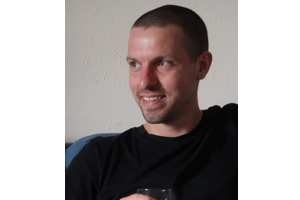
Fiona Macfarlane, PhD graduate
Thesis title
Mathematical modelling of tumour-immune competition tumour growth: discrete and continuum approaches
How would you describe your research project?
My main research focus was developing probability-based mathematical models that described tumour and immune system interactions. We considered cancer cells as independent individuals who could then interact with different types of immune cells. The mechanisms involved in the models were based on published biological data and biological understanding. Once the models were developed, we used them to investigate the required conditions for the immune system to successfully remove the tumour. The results suggested which tumour-immune mechanisms may be beneficial to target in the context of immunotherapy.
What attracted you to undertake your research at St Andrews?
I knew that I wanted to work on math modelling of cancer, as I had begun to look at this in my honours project for my undergraduate degree. Prof. Chaplain is an expert in this area, so I wanted to work with him specifically, and others in his research group.
How has the School of Mathematics and Statistics helped you with your research or to develop your skills and knowledge?
The school provided opportunities for giving internal presentations as well as providing funding to attend external conferences. Giving research talks and presenting posters was a great way for me to build up confidence in sharing my research as well as providing networking opportunities. There is also a strong PhD student community, who were very useful in giving support and advice on various aspects of PhD life.
What have you been doing since you graduated?
I am still working in the Mathematical Biology group at St Andrews as a post-doctoral research fellow. We are continuing on with some of the work I did throughout my PhD and starting a few new projects too.
What piece of advice would you give to someone thinking about doing a PhD in Mathematics and Statistics?
I would say find a topic you are passionate about and a supervisor who suits your style of working.
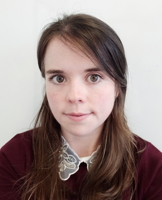
Thomas Howson, PhD graduate
Thesis title
Three Dimensional MHD Simulations of the Dynamics and Energetics of Coronal Flux Tubes
How would you describe your research project?
My PhD research focused on the coronal heating problem: how is the Sun’s atmosphere maintained at temperatures of more than 106 K given that the surface of the Sun is two orders of magnitude cooler. My project explored oscillations in the solar corona and investigated the dissipation of wave energy as heat. In order to make progress, I used a magnetohydronamics (MHD) code to run large scale, three dimensional simulations of the Sun’s atmosphere. I investigated the decay of standing waves in coronal loops and analysed the growth rate of the Kelvin-Helmholtz instability which can develop during the wave damping. I also spent time learning to visualise large data sets in order to understand my numerical results.
What attracted you to undertake your research at St Andrews?
Prior to starting my PhD, I was a Mathematics undergraduate in St Andrews and thoroughly enjoyed my time here. I was keen to continue to live in St Andrews and also to contribute to the research life of the university. I had previously undertaken a research experience for undergraduates (REU) at Montana State University in Bozeman, USA which investigated energy release during solar flares. This helped me to decide that I would like to pursue further solar physics research following the completion of my degree. The School of Mathematics and Statistics has a world-renowned solar theory group so I thought I should apply for a PhD in St Andrews.
How has the School of Mathematics and Statistics helped you with your research or to develop your skills and knowledge?
During my PhD, I had access to help and expertise from world-leading academics and an extensive support team in the form of post-doctoral researchers and many other PhD students. I had easy access to high performance computing facilities in St Andrews and the relevant training in order to allow my project to be successful. Additionally, the School of Mathematics and Statistics provided me with funding for travel to international conferences and workshops. This allowed me to present my research results to a wide audience and foster collaborations with students and academics at other institutions. I also had extensive opportunities to tutor undergraduate students which introduced me to teaching in universities and helped financially too.
What have you been doing since you graduated?
Since graduating, I have been working as a Post-doctoral Research Assistant in St Andrews. Alongside my former PhD supervisor, I have been continuing with my research into the coronal heating problem. In particular, we have been studying the propagation and dissipation of MHD wave modes in complex magnetic field topologies. I have also lectured on Mathematics modules and the university’s International Foundation Programme for Science.
What piece of advice would you give to someone thinking about doing a PhD in Mathematics and Statistics?
Knowing whether a PhD is for you is very difficult. Most people have very little experience of research before they begin so it is usually a big leap into the unknown. It is often said that PhDs provide a very different experience to taught degrees and this is certainly true. They can be very frustrating for long periods of time and writing a thesis at the end is not particularly enjoyable! However, you will become the world-leading expert in your specific research project and you will have picked up many important skills along the way. There is great satisfaction in solving problems and advancing our scientific knowledge. You will meet fantastic colleagues in St Andrews and PhDs open a range of new career opportunities.
Ultimately, I’m very happy that I chose to do a PhD in St Andrews but it is a very personal choice. You need to be sure that you want to spend around four years of your life pursuing research. Don’t worry if you have no idea what your research project will be – it often takes years for experienced academics to figure out an extensive research plan. Your project will naturally evolve during your time as a PhD student and will probably end up being a good deal different from any initial plan. Finally, if you’re not familiar with St Andrews then please try to come and visit. It’s a great place to live and work but is also very different from being in a big city. It's extremely useful to speak to academics and current PhD students about potential projects and to see what life as a researcher in St Andrews is like.
